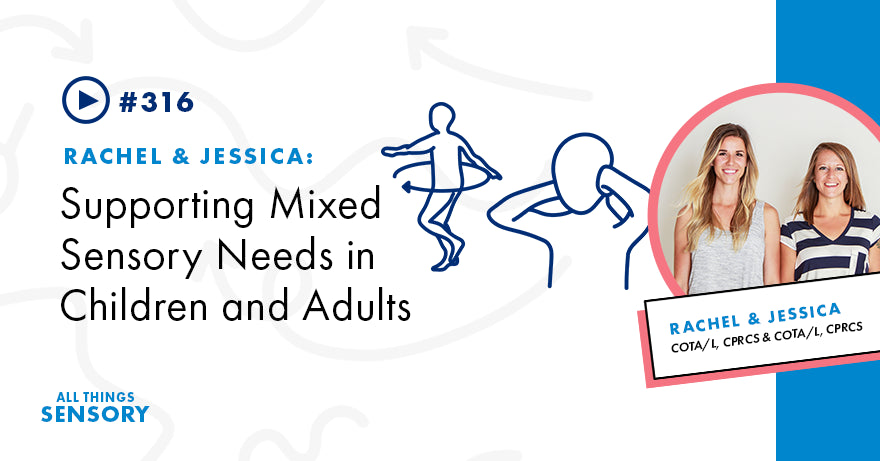Your Cart is Empty

We talk a lot about sensory seekers and sensory avoiders, but it’s very common - and to be expected - that a child will have mixed sensory needs.
What does this mean exactly? And how can we help provide the just-right sensory input to help a child feel calm and regulated when they have mixed sensory needs?!
In this episode, we talk about personalized sensory diets, proprioception, visual schedules, and primitive reflexes!
Free Sensory Diet Webinar
We’d love to answer your questions on the podcast! Fill out this form -> https://harkla.typeform.com/to/ItWxQNP3
All Things Sensory Podcast Instagram
Harkla Website - Shop Sensory Products!
We often discuss how to support children with sensory-seeking or sensory-avoiding behaviors, but it's essential to recognize that many have mixed sensory profiles. This means a child might seek sensory input in some areas while avoiding it in others.
Many children have mixed sensory profiles, and understanding them helps us tailor our strategies to better meet each child's needs. For example, a child may seek input like jumping and crashing for grounding while being sensitive to loud noises.
This comprehensive approach ensures that we are not only focusing on one aspect of their sensory needs but are considering the entire spectrum to promote their overall sensory processing and well-being. It requires continuous observation and adjustments as the child's needs may evolve over time or during the day.
In challenging moments, these tips can be incredibly helpful:
Incorporate activities they crave
If your child enjoys jumping and running, include those activities in their daily routine. Don’t force them into activities they avoid; instead, provide a variety of safe experiences.
Use proprioception to calm the nervous system
Activities like heavy work, deep touch pressure, and massage can help regulate the sensory system. Use these activities before and during challenging tasks.
Create sensory circuits
For sensory seekers, create a circuit-style routine that includes their preferred activities. For example, jumping on a trampoline, doing medicine ball slams, and walking across a balance beam can help meet their high sensory threshold.
Use a visual schedule
They help children understand and organize their day, provide a sense of control, and can reduce anxiety
Teach children about their sensory needs
Help children understand their sensory needs and advocate for themselves. Use visuals, emotions, and communication tools appropriate for their level.
Model sensory self-advocacy
Show children how you manage your sensory needs. When they see you advocating for themselves, they are likely to do the same.
Incorporate primitive reflex integration
Many sensory processing issues are related to retained primitive reflexes. To improve sensory regulation, incorporate activities that address these reflexes.
Understanding and supporting mixed sensory needs is a journey of trial and error. By incorporating these tips and adapting them to your child’s unique needs, you can create a supportive environment that helps them thrive.
BORING, BUT NECESSARY LEGAL DISCLAIMERS
While we make every effort to share correct information, we are still learning. We will double check all of our facts but realize that medicine is a constantly changing science and art. One doctor / therapist may have a different way of doing things from another. We are simply presenting our views and opinions on how to address common sensory challenges, health related difficulties and what we have found to be beneficial that will be as evidenced based as possible. By listening to this podcast, you agree not to use this podcast as medical advice to treat any medical condition in either yourself or your children. Consult your child’s pediatrician/ therapist for any medical issues that he or she may be having. This entire disclaimer also applies to any guests or contributors to the podcast. Under no circumstances shall Rachel Harrington, Harkla, Jessica Hill, or any guests or contributors to the podcast, as well as any employees, associates, or affiliates of Harkla, be responsible for damages arising from use of the podcast.
Keep in mind that we may receive commissions when you click our links and make purchases. However, this does not impact our reviews and comparisons. We try our best to keep things fair and balanced, in order to help you make the best choice for you.
This podcast should not be used in any legal capacity whatsoever, including but not limited to establishing “standard of care” in a legal sense or as a basis for expert witness testimony. No guarantee is given regarding the accuracy of any statements or opinions made on the podcast.
Comments will be approved before showing up.